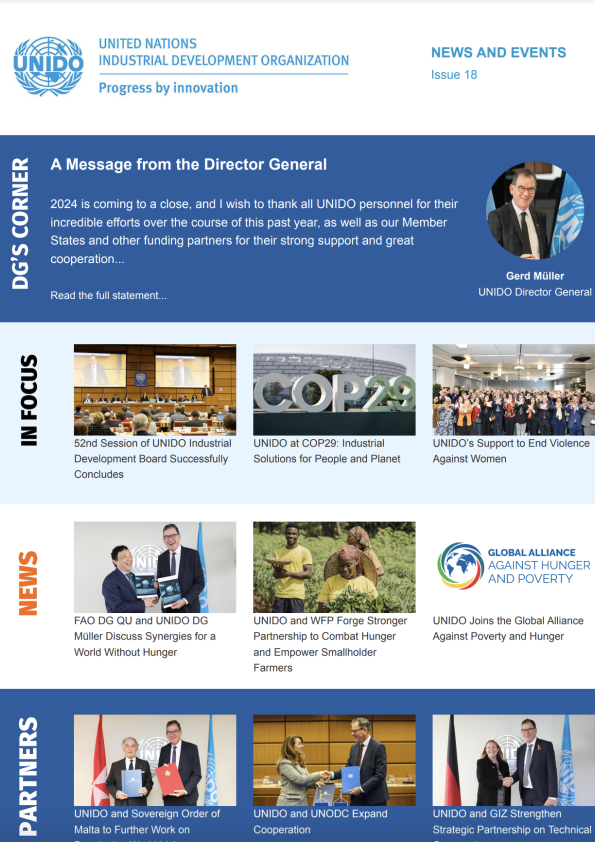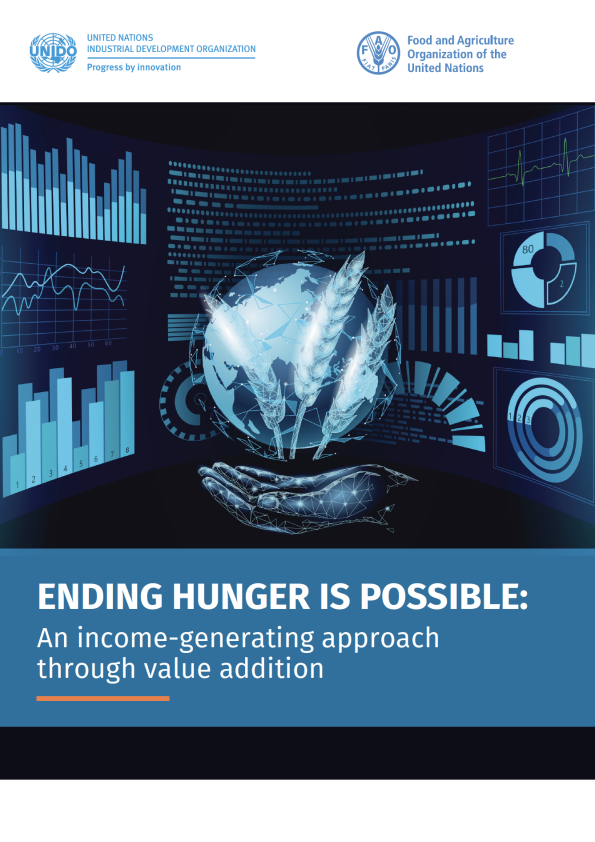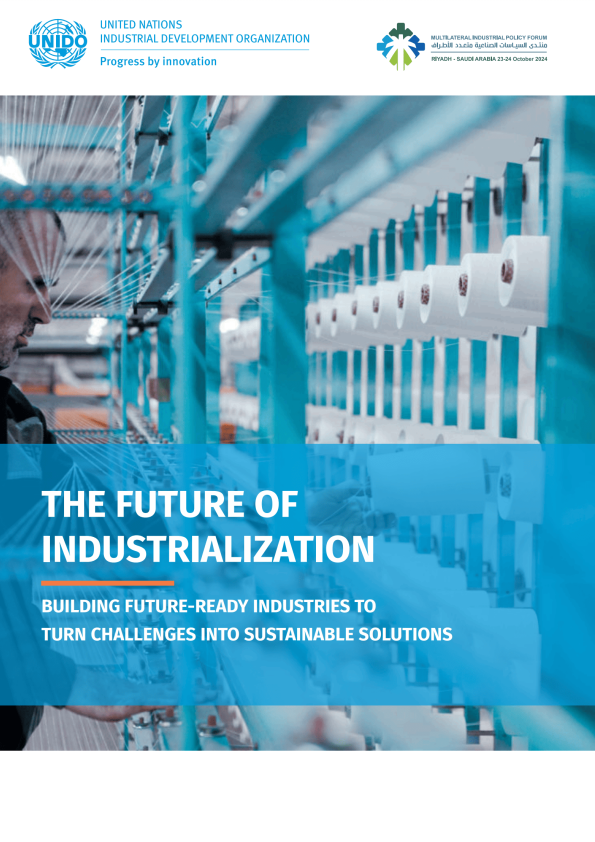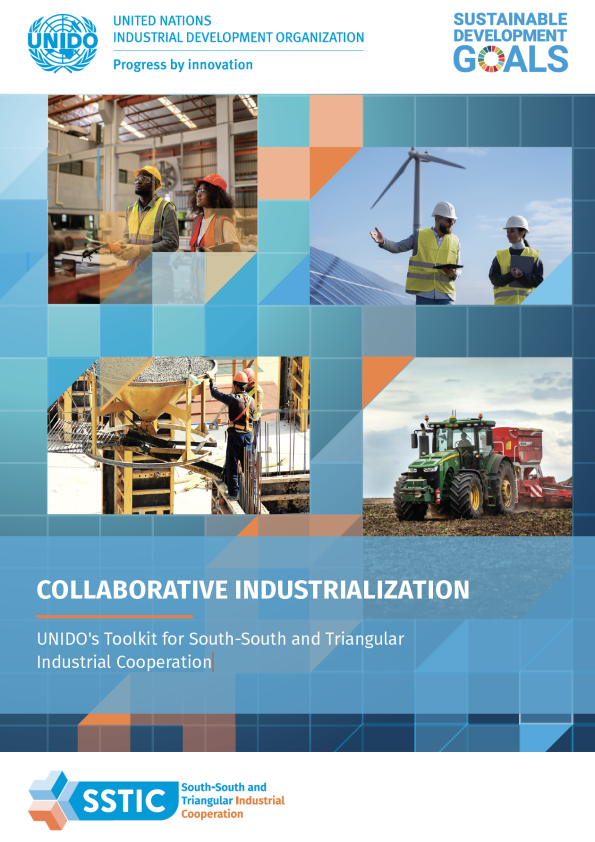UNIDO Publications

2024 | Author(s): J. Ferraz, W. Peres, A. Lavopa, C. Seri
#Policy Brief
Latin America and the Caribbean (LAC) has shown mixed results in their performance towards achieving the SDGs most closely related to industrial development. Significant progress is observed in energy-related SDGs but large gaps are registered in the targets related to employment, economic growth, industrial development and innovation. This brief presents specific case studies from the region to illustrate how targeted policies can foster industrial development to address current gaps while leveraging on existing opportunities tied to these megatrends.

The Role of the G20 in Promoting Green and Just Transitions
2024 | Author(s): UNIDO, OECD, ILO, UNCTAD
A green and just transition – i.e. concerted global and national efforts to achieve worldwide carbon neutrality by or around the mid-century globally, in an inclusive manner and adapted to each national context – requires an active co-operation of all countries, developed and developing. It also entails ensuring that no one is left behind, and offering support to those in need, including least developed countries (LDCs) and Small Island Developing States (SIDS). Guided by the preamble of the Paris Agreement, this report proposes ways for G20 and developing countries to enhance the coherence of their policies towards that vision, deepen their co-operation and render the international architecture better suited to the implementation of green and just transitions.

2024 | Author(s): Z. Zavarská, B. Jovanović, O. Pindyuk, A. Lavopa, G. Martí
#Policy Brief
Recent years have witnessed a shift towards more active industrial policy interventions in Eastern Europe. However, challenges remain and targeted interventions to spur industrial competitiveness and bring the region closer to realizing the SDGs by 2030 are urgently needed. This policy brief presents some areas where modern industrial policies can accelerate SDG progress by leveraging advanced digitalization, clean energy production, FDI attraction and regional integration.

2024 | Author(s): A. Mishrif, R. Rasiah, C. Donnelly, N. Haraguchi
#Policy Brief
Asia-Pacific has shown considerable progress toward achieving the SDGs, particularly in areas such as access to energy and industrial production. However, challenges remain in the adoption of clean energy, employment, and innovation. Modern industrial policy can play a key role in bridging these gaps. This policy brief highlights how Asia-Pacific countries can leverage opportunities in green energy, digitalization, regional integration, and demographic changes to accelerate progress toward achieving SDG 7, 8, and 9.

International Yearbook of Industrial Statistics - 2024
2024 | Author(s): UNIDO
#International Yearbook of Industrial Statistics
The 30th edition of the International Yearbook of Industrial Statistics summarizes the long-term transformation of global industry over the past decades as it develops to become the ’Industry of the Future’. This will be defined by intelligent production systems which are powered by sustainable energy, reusing resources and materials, and harnessing the power of digitalization and AI to optimize quality and productivity. In addition to this big picture overview, our Yearbook presents the latest and emerging trends in industry worldwide, as well as specifically in the various regions and sectors around the world.

IID Policy Brief 15: Manufacturing-led growth: driving and sustaining economies
2024 | Author(s): A. Lavopa, F. Riccio
#Policy Brief
Economic growth and development are positively associated with industrialization. This is supported by a large body of literature emphasizing the role of manufacturing as the key “progressive sector”. This policy brief provides new evidence on the manufacturing growth nexus by examining “growth episodes” and the role that manufacturing has played in recent history in boosting a country’s economic growth.

GCIP Cleantech Innovation Capacity Building Framework
2024 | Author(s): UNIDO, Cleantech Group
This framework is a key component of the UNIDO's Global Cleantech Innovation Programme (GCIP) activities which focus on the Cleantech Innovation and Entrepreneurship Ecosystem (CIEE) strengthening and connectivity. Through GCIP, UNIDO helps strengthen the capacity of national cleantech innovation and entrepreneurship ecosystems in the GCIP partner countries, identifies synergies across these national ecosystems and facilitates knowledge exchange and partnership building among different CIEEs. This Framework serves as the reference document for these activities. It should be read in conjunction with other ecosystem strengthening outputs of GCIP, including the Cleantech Innovation Policy Strategy Framework, the Cleantech Innovation Cluster Development Framework, and the Cleantech Ecosystem Actor Engagement Framework. The Capacity Building Framework includes an evaluation questionnaire that countries can use to evaluate the maturity of key drivers of ecosystem effectiveness.

GCIP Cleantech Innovation Cluster Development Framework
2024 | Author(s): UNIDO
This framework is part of the UNIDO's Global Cleantech Innovation Programme (GCIP) activities which address Cleantech Innovation and Entrepreneurship Ecosystem (CIEE) strengthening and connectivity. Through GCIP, UNIDO helps strengthen the capacity of national cleantech innovation and entrepreneurship ecosystems in the GCIP partner countries, identifies synergies across these national ecosystems and facilitates knowledge exchange and partnership building among different CIEEs. The purpose of this framework is to provide guidance to project executing entities (PEEs) in GCIP partner countries in defining, recommending and implementing activities to develop successful and inclusive regional innovation clusters that have the potential of fostering high growth cleantech companies.

GCIP Cleantech Innovation Policy Strategy Framework
2024 | Author(s): UNIDO, Cleantech Group
This framework is a key component of the UNIDO's Global Cleantech Innovation Programme (GCIP) activities which focus on the Cleantech Innovation and Entrepreneurship Ecosystem (CIEE) strengthening and connectivity. Through GCIP, UNIDO helps strengthen the capacity of national cleantech innovation and entrepreneurship ecosystems in the GCIP partner countries, identifies synergies across these national ecosystems and facilitates knowledge exchange and partnership building among different CIEEs. The purpose of this framework is to provide guidance to policymakers and project executing entities (PEEs) in the GCIP partner countries in defining and implementing policy strategies to promote cleantech innovation and entrepreneurship and to increase the participation of women and youth in cleantech entrepreneurial activities and as leaders in this sector.

GCIP Cleantech Innovation Actor Engagement Framework
2024 | Author(s): UNIDO, Cleantech Group
This framework is an integral component of the UNIDO's Global Cleantech Innovation Programme (GCIP) activities which focus on the Cleantech Innovation and Entrepreneurship Ecosystem (CIEE) strengthening and connectivity. Through GCIP, UNIDO helps strengthen the capacity of national cleantech innovation and entrepreneurship ecosystems in the GCIP partner countries, identifies synergies across these national ecosystems and facilitates knowledge exchange and partnership building among different CIEEs. The purpose of this report is to provide guidance to project executing entities (PEEs) in GCIP partner countries in designing and implementing coordinated activities aimed at increasing internal connectedness in national and local CIEEs.

IID Policy Brief 12: Bridging the AI divide: Empowering developing countries through manufacturing
2024 | Author(s): G. Anzolin, N. Haraguchi, A.P. Nishio De Sousa, A. Savrasov, J. Reis
#Policy Brief
The disparity in AI development between advanced and developing countries threatens to widen the technological gap, with the latter frequently relegated to being mere consumers (i.e. becoming ‘technological colonies’) rather than becoming innovators and producers in this rapidly evolving field. This article presents a comprehensive review of the current state of AI innovation and distribution, which highlights the concentration of capabilities and resources in a handful of advanced economies.

2024 | Author(s): UNIDO
The purpose of this document is to outline the concept that will serve as a framework for using standards and technical regulations as a means to support Ukraine and its institutions in their efforts towards green reconstruction. The structure of the document is built up of five sections: 1) The context for Ukraine’s green reconstruction; 2) Guiding Framework on Standards and Technical Regulations; 3) Catalogue of European and international standards and technical regulations; 4) Actors from private and public sectors; and 5) Future steps to implement the National Guiding Framework for the Green Reconstruction of Ukraine.

2024 | Author(s): UNIDO
The implementation plan has been developed to translate the National Guiding Framework into concrete actions on how to use standards and technical regulations for the green reconstruction of Ukraine. The goal is to strengthen Ukraine’s quality infrastructure system, particularly by promoting standards and guiding technical regulations in post-war reconstruction projects.

2024 | Author(s): UNIDO
Ukraine finds itself at a crossroads between rebuilding the infrastructure the way it has been done in the past or in a sustainable manner, using green standards, the most advanced practices and state-of-art technologies. This would enable the country to use the reconstruction efforts as a springboard for sustainability. Indeed, if based on sustainability principles, reconstruction can overcome a major carbon footprint, reducing potential climate impact and improving energy and resource efficiency. This document presents an impact assessment for the use of standards and technical regulations for the green reconstruction of Ukraine.





